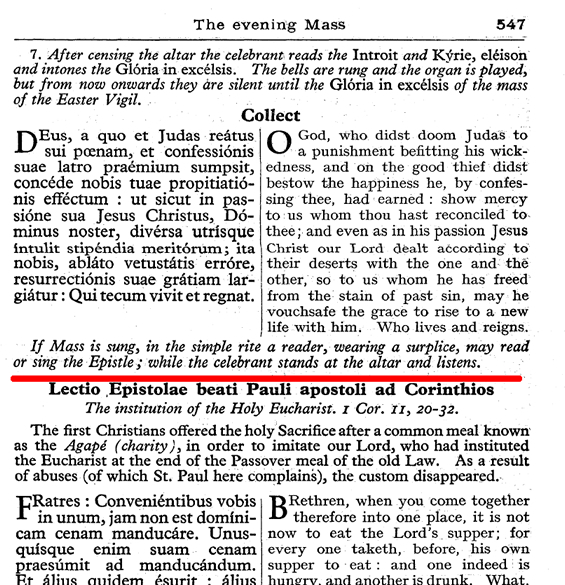Layman chanting epistle at Sung Mass in EF?
-
I know that laymen can substitute as "straw subdeacons" during Solemn High Mass in the EF, if there is no other cleric around to fill the role. Subdeacons or clerics also have the privilege of being able to chant the epistle during Sung Masses (Missa Cantata, without a deacon and subdeacon) in the EF. Can a layman, during a Sung Mass, vest in cassock and surplice and chant the Epistle during a Sung Mass?
-
Yes he can; you can find the provision for this in the Ritus servandus in celebratione Missae, nr. viii in the missal:
In Missis cantatis Epistola a ministrante cani potest; secus sufficit ut legatur a celebrante, qui tamen potest Epistolam more solito canere.
Own translation:
In sung masses the Epistle can be sung by a server; it is also sufficient if it is read by the celebrant, who also can sing the Epistle in the usual way.
I have even done that myself once. -

I think this rubric will surprise many. It will also surprise many to learn (as I recently did) that the "four-hymn sandwich" was FREQUENTLY sung for Low Masses before the Second Vatican Council. -
However, I think a "straw" subdeacon must be a cleric.
-
However, I think a "straw" subdeacon must be a cleric.
I read that for a straw subdeacon a tonsurist suffices.
I heard on the internet that Ecclesia Dei required the subdeacon to be an instituted acolyth (if I remember correctly, acolythes in the NOM do almost the same as subdeacons in the VOM apart from proclaiming the epistle, so an instituted acolyte would do everything a subdeacon IMO). -
Protasius,
Yes an instituted acolyte may act as a straw subdeacon. Fr. Z has discussed this several times at his blog (here: http://wdtprs.com/blog/2011/04/quaeritur-tlm-straw-subdeacon/). Basically Pope Paul VI abolished the office of subdeacon with Ministeria quaedam and it's former role was assumed by the new version of lector and acolyte. The new acolyte may be called a subdeacon. The question was also adressed (and answered in the affirmative) in a letter from the Pontifical Commission "Ecclesia Dei" (7 June 1993, Prot. 24/92) to the Australian Ecclesia Dei Society. "The PCED said then that, yes, an officially installed acolyte could take the role of the subdeacon in a Solemn Mass if a cleric wasn’t there to take the role."
Hope this helps!
Patrick -
But this would mean, that an acolyt would act as a subdeacon, whilst a straw subdeacon omits several procedures not permitted to ordinary laymen such as purifying the vessels and pouring water in the chalice in the course of the offertory.
-
Apparently, Fortescue disagrees with us. On p. 160 of the 2003 edition, there is a footnote citing a decision of the Sacred Congregation of Rites (SRC 3377) saying that, to chant the epistle at Sung Mass, one must be at least a cleric.
Well, that's a bummer. -
JMO, why was it a surprise to learn that the "four-hymn sandwich" was common at Low Masses before V2?
-
The question of who is permitted to chant the epistle is somewhat dubious, given the interplay of the 1983 canons, the 1962 rubrics, and the stated intentions of the Summorum Pontificum family of legislation.
The rubric JMO posted contained on an image of a page from the 1958 Mass and Vespers refers to the word "Reader", which was an attempted translation of the Latin word lector, which in 1958 meant a seminarian who had been ordained to the minor order of lector.
Reid's recent editions of Fortescue should be considered influential but not authoritative. Here, I think we can discount Reid's interpretation of the qualification necessary to chant the Epistle as overly strict, given that the clerical state now begins not at tonsure but at the diaconate (as clarified by Universae Ecclesiae).
Seminarians in both traditional and modern seminaries will undergo either the rites of tonsure and ordination to lector, or institution as lector, at some point well before the diaconate, and it would seem proper for both sorts of seminarians to be permitted to chant the Epistle today.
But again, the issue is dubious, and there are many places where laymen who have never been to seminary do chant the Epistle at the Sung TLM today, just as there are many (more) places where laymen serve as straw subdeacons (another dubious rule) and chant the Epistle at the Solemn TLM.
Welcome to the MusicaSacra Forum!
To participate in the discussions on Catholic church music, sign in or register as a forum member, The forum is a project of the Church Music Association of America.
Categories
- All Discussions21,270
- General Music Discussion8,293
- Job Openings214
- Management of Music Programs852
- Choral Matters534
- Church Documents and Rubrics528
- CMAA Notes304
- Events730
- For Newcomers: Read First26
- Sacred Polyphony548
- Hymnody875
- Gregorian Chant: General2,708
- ↳ Graduale Romanum and Liber Usualis369
- ↳ Graduale Simplex60
- ↳ Semiology63
- Vernacular Plainsong697
- Anglican Use and Anglican Chant68
- Organ, Other Instruments and Repertoire438
- New Composition/Works in Progress1,302
- Recordings234
- Music for Hispanic Ministry162
- Music Education: Children213
- Music Education: General222
- News Items245
- Positions Wanted3
- General Discussion: Catholicism740
- Amusements178
- General Discussion1,037
- Opinions119


